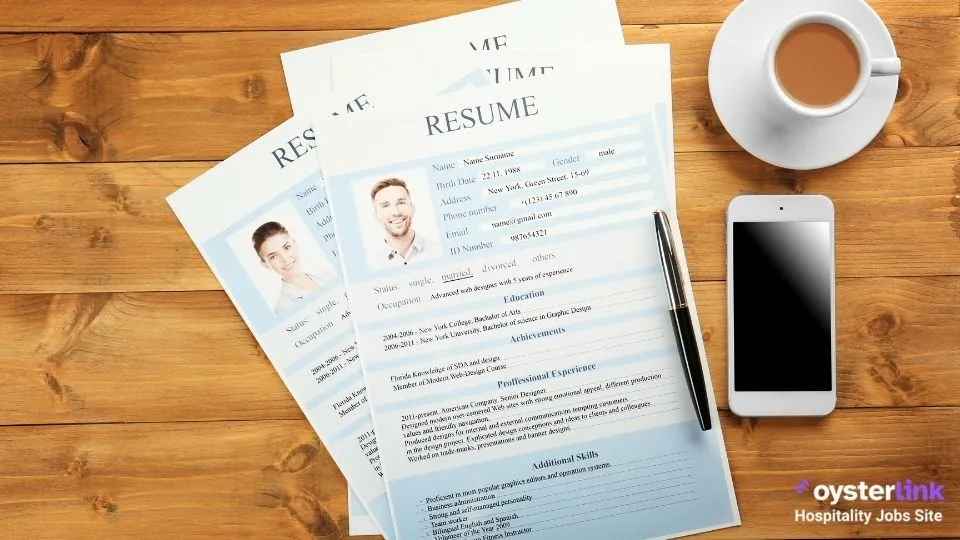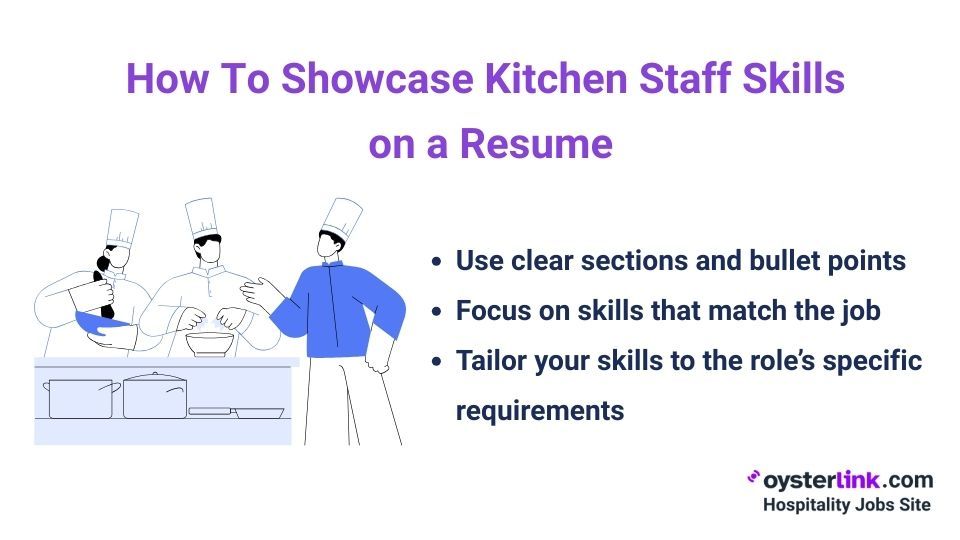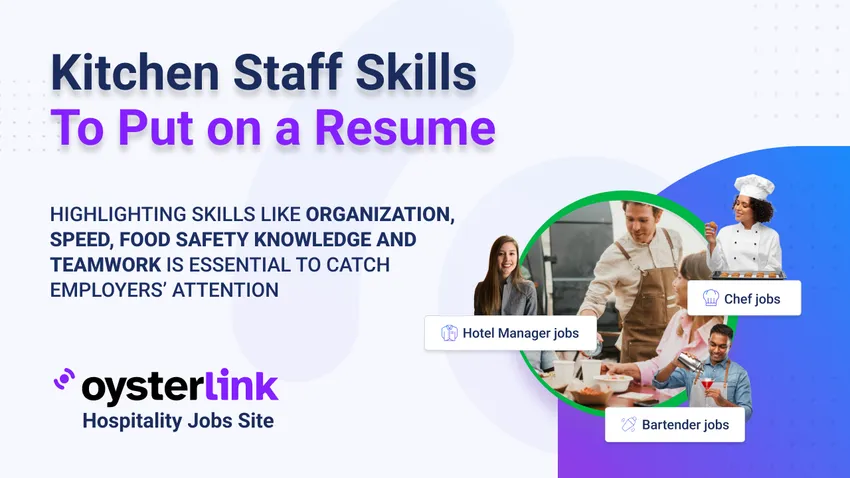Finding a great job in a busy kitchen starts with a strong resume.
Whether you're aiming to be a Line Cook or a Sous Chef, the skills you highlight can make or break your application.
This guide will discuss 10 essential kitchen staff skills you should include to stand out in the competitive hospitality industry.
Why Skills Matter on a Kitchen Staff Resume
Your skills section is more than just filler; it’s a snapshot of how you handle the fast-paced, high-pressure demands of the kitchen.
Whether it’s managing tight deadlines or keeping your station organized, the right skills reflect your ability to contribute effectively in a busy environment.
The skills you highlight should align with the job description, as employers are looking for candidates who meet their specific needs.
By emphasizing the skills most relevant to the role, you show that you can quickly adapt and be a valuable addition to their team.
10 Kitchen Staff Skills To Put on Your Resume

Let’s dive into the specific skills that can make your resume stand out.
1. Organizational skills
An efficient kitchen thrives on organization. Whether it’s keeping your station tidy, labeling ingredients correctly or making sure everything is prepped and ready to go, organizational skills show you're reliable and prepared.
2. Time management
In a busy kitchen, timing is crucial. From prepping ingredients to ensuring orders go out on time, effective time management is key to keeping everything running smoothly.
Kitchens rely on tight schedules, and employers need staff who can meet deadlines, especially during peak hours.
3. Knife skills and food preparation
Knife skills are essential for any kitchen role, as they combine precision and safety. Employers look for staff who can chop, dice, fillet and portion ingredients quickly and accurately while minimizing waste.
The ability to handle knives with skill and confidence shows you understand food prep techniques and are capable of working efficiently.
It’s not just about speed — it’s also about consistency and attention to detail.
4. Teamwork and communication
Kitchens run on collaboration. Whether you’re working with other kitchen staff or communicating with the front-of-house team, teamwork is essential to making sure everything flows seamlessly.
Clear communication ensures everyone’s on the same page, reducing mistakes and delays. Employers appreciate staff who can stay calm and maintain positive communication even during high-pressure situations.
5. Food safety and sanitation knowledge
Hygiene and food safety are non-negotiable in food service. Employers want to see that you understand health codes, allergy protocols and safe food storage.
A solid knowledge of sanitation practices ensures you keep the kitchen clean and safe for everyone.
Highlighting any relevant certifications like Hazard Analysis Critical Control Point (HACCP) or ServSafe shows you're committed to upholding industry standards and reducing risks in the kitchen.
6. Creativity and adaptability
Kitchens are unpredictable, and being adaptable is essential for staying on top of things. Employers need staff who can adjust quickly without missing a beat.
Handling last-minute ingredient changes, adjusting to a rush or working with new equipment requires flexibility to keep operations running smoothly.
Creativity is just as important. Coming up with new dishes, using ingredients in innovative ways or designing unique presentations keeps the menu fresh and exciting.
Creativity also helps solve problems when things don’t go as planned, ensuring service stays on track.
7. Equipment operation and maintenance
Modern kitchens rely on a variety of specialized equipment, so knowing how to operate and maintain tools like ovens, fryers and mixers is crucial.
Employers need staff who can use and care for equipment properly, as well as troubleshoot minor issues to avoid downtime.
8. Problem-solving under pressure
Kitchens are fast-paced, and problems are bound to pop up. Whether it’s ingredient shortages, equipment failures, or delays, being able to think on your feet and solve issues quickly is crucial.
Employers need staff who can stay calm under pressure and handle challenges without affecting service.
9. Customer-focused mindset
Even when you're behind the scenes, your work directly affects the customer experience.
Skills like plating, presentation and customizing dishes for dietary restrictions show you care about delivering a great dining experience.
Employers want staff who are attentive to customer satisfaction, whether it’s ensuring dishes are prepared to order or making sure everything is presented well.
10. Multitasking
Kitchens require staff who can manage multiple tasks at once. Whether it’s prepping different stations, helping a colleague or managing orders, multitasking is essential.
Employers look for staff who can handle competing priorities without losing focus.
Additional Skills That Can Boost Your Resume
While the core skills listed earlier are essential for any kitchen role, adding a few extras can help you stand out from the competition.
These additional skills show employers that you bring more to the table than just the basics:
- Multilingual abilities: Speaking multiple languages is a valuable asset in diverse kitchen teams or tourist-heavy areas. It can improve communication among staff and help create a better dining experience for customers.
- Leadership and training: If you’ve had experience mentoring junior staff, leading prep shifts or stepping into a leadership role when needed, it shows that you can take initiative. Employers value candidates who can support their team and ensure smooth operations during busy hours.
- Tech proficiency: Kitchens increasingly rely on technology for inventory management, scheduling and even menu planning. Familiarity with kitchen management software, point-of-sale (POS) systems or inventory tracking tools can set you apart.
Tips for Showcasing Kitchen Staff Skills on Your Resume
Crafting a resume that stands out takes more than just listing skills — you need to present them effectively. Here are some practical tips to ensure your resume grabs attention:
- Organize for readability: Use clear sections and concise bullet points to make your resume easy to scan. Hiring managers often spend just seconds reviewing applications, so structure your resume with simple formatting and avoid clutter.
- Keep it relevant: Focus on skills that are directly related to the job you’re applying for. While it’s great to show a broad range of abilities, highlighting those that align with the role's demands will make a stronger impression.
- Tailor your skills to the job description: Match your skills to the specific requirements of the role you’re applying for. If a job emphasizes food safety certifications or the ability to handle high-volume service, make sure those stand out in your resume.

Advance Your Hospitality Journey With OysterLink
Your skills are the backbone of your resume. By showcasing technical expertise, teamwork and adaptability, you can prove you're ready to tackle the challenges of any kitchen.
But finding the right job isn’t just about having a great resume — it’s about knowing where to look.
That’s where OysterLink comes in. OysterLink connects kitchen staff with top-paying hospitality jobs, provides valuable tools and offers career advice for hospitality professionals.
Whether you’re just starting out or looking to level up, OysterLink can help you take the next step in your career.









Loading comments...